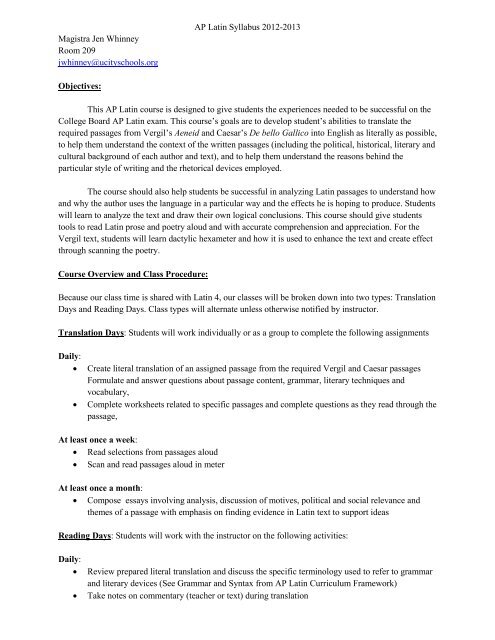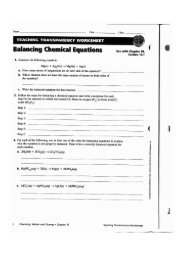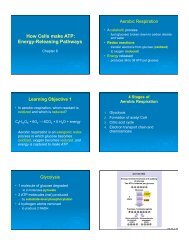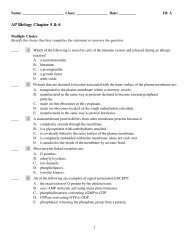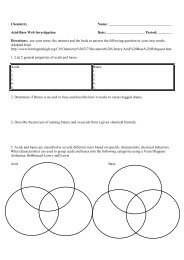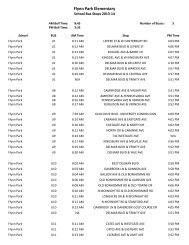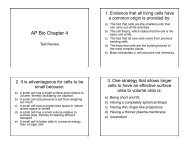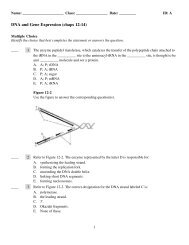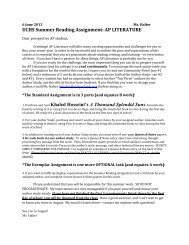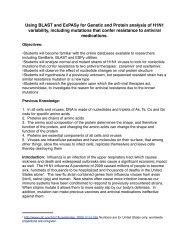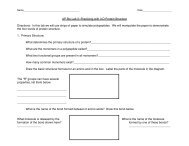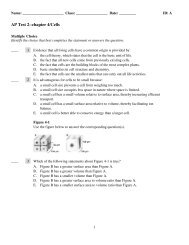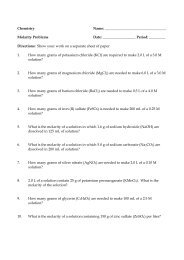AP Latin Syllabus 2012-2013 Magistra Jen Whinney Room 209 ...
AP Latin Syllabus 2012-2013 Magistra Jen Whinney Room 209 ...
AP Latin Syllabus 2012-2013 Magistra Jen Whinney Room 209 ...
You also want an ePaper? Increase the reach of your titles
YUMPU automatically turns print PDFs into web optimized ePapers that Google loves.
<strong>Magistra</strong> <strong>Jen</strong> <strong>Whinney</strong><br />
<strong>Room</strong> <strong>209</strong><br />
jwhinney@ucityschools.org<br />
<strong>AP</strong> <strong>Latin</strong> <strong>Syllabus</strong> <strong>2012</strong>-<strong>2013</strong><br />
Objectives:<br />
This <strong>AP</strong> <strong>Latin</strong> course is designed to give students the experiences needed to be successful on the<br />
College Board <strong>AP</strong> <strong>Latin</strong> exam. This course’s goals are to develop student’s abilities to translate the<br />
required passages from Vergil’s Aeneid and Caesar’s De bello Gallico into English as literally as possible,<br />
to help them understand the context of the written passages (including the political, historical, literary and<br />
cultural background of each author and text), and to help them understand the reasons behind the<br />
particular style of writing and the rhetorical devices employed.<br />
The course should also help students be successful in analyzing <strong>Latin</strong> passages to understand how<br />
and why the author uses the language in a particular way and the effects he is hoping to produce. Students<br />
will learn to analyze the text and draw their own logical conclusions. This course should give students<br />
tools to read <strong>Latin</strong> prose and poetry aloud and with accurate comprehension and appreciation. For the<br />
Vergil text, students will learn dactylic hexameter and how it is used to enhance the text and create effect<br />
through scanning the poetry.<br />
Course Overview and Class Procedure:<br />
Because our class time is shared with <strong>Latin</strong> 4, our classes will be broken down into two types: Translation<br />
Days and Reading Days. Class types will alternate unless otherwise notified by instructor.<br />
Translation Days: Students will work individually or as a group to complete the following assignments<br />
Daily:<br />
• Create literal translation of an assigned passage from the required Vergil and Caesar passages<br />
Formulate and answer questions about passage content, grammar, literary techniques and<br />
vocabulary,<br />
• Complete worksheets related to specific passages and complete questions as they read through the<br />
passage,<br />
At least once a week:<br />
• Read selections from passages aloud<br />
• Scan and read passages aloud in meter<br />
At least once a month:<br />
• Compose essays involving analysis, discussion of motives, political and social relevance and<br />
themes of a passage with emphasis on finding evidence in <strong>Latin</strong> text to support ideas<br />
Reading Days: Students will work with the instructor on the following activities:<br />
Daily:<br />
• Review prepared literal translation and discuss the specific terminology used to refer to grammar<br />
and literary devices (See Grammar and Syntax from <strong>AP</strong> <strong>Latin</strong> Curriculum Framework)<br />
• Take notes on commentary (teacher or text) during translation
At least once a week:<br />
• Present both student and teacher led presentations and discussions of cultural and historical<br />
topics, characters, geography of the ancient world, and relevant literary techniques<br />
• Read unseen passages of both poetry and prose from authors such as Cicero, Catullus, Ovid,<br />
Sallust and Pliny, including non-syllabus based passages from Vergil and Caesar and answer<br />
comprehension, stylistic and grammar questions on the passages.<br />
Students will be expected to work independently and to keep pace with the schedule of readings.<br />
Tests and Quizzes:<br />
Students take a quiz over the assigned passages each week. Questions may include literal translation of a<br />
section of a passage; short answers on identifying themes and uses of the language including specific<br />
terminology for grammar and literary devices; relevant vocabulary, grammar, scansion, historical and<br />
cultural content and literary techniques.<br />
Tests will be given every after students have read and analyzed key passages, roughly after 200 lines.<br />
Tests will cover same content as quizzes but also add an essay component involving discussion of<br />
motives, political and social relevance and themes. Emphasis will be on finding evidence in the <strong>Latin</strong> text<br />
to support their ideas. Objective questions will cover English readings over the selected books in<br />
conjunction with required <strong>Latin</strong> passages.<br />
Textbook and Materials<br />
1. The Aeneid in <strong>Latin</strong>: Book 1.1-<strong>209</strong>, 418-440, 494-578; Book 2.40-56, 201-<br />
249, 268-297, 559-620; Book 4.160-218, 259-361, 659-705; Book<br />
6.295-332, 384-425, 450-476, 847-899. (Clyde Pharr Text)<br />
Grading<br />
2. The Gallic Wars in <strong>Latin</strong>: Book 1.1-7; Book 4.24-35, Book 5.24-48; Book<br />
6.13-20. (Text not yet decided on)<br />
3. Entire Aeneid in English translation (Books 1, 2, 4, 6, 8, and 12 read during year)<br />
Recommended translations: Robert Fagles, Sarah Ruden, Robert<br />
Fitzgerald, Allen Mandelbaum, C. Day Lewis, David West, Rolfe Humphries<br />
4. The Gallic Wars in English translation: Books 1, 6, and 7 (provided by instructor).<br />
Supplementary Articles to be provided by instructor.<br />
15% Translation day assignments: worksheets on grammar, culture or language; essays,<br />
20% Review day assignments: translations; presentations on culture; sight reading; reading aloud<br />
25% Quizzes: translation and vocabulary<br />
30% Tests<br />
10% Individual research and terminology projects
Course Schedule<br />
First Semester: Vergil’s Aeneid<br />
Week 1: Review <strong>Latin</strong> grammar and discuss entire Aeneid in translation Chapters 1-12 including cultural<br />
background information.<br />
Week 2: Aeneid Book 1:1-60<br />
Week 3: Aeneid Book 1: 61-120<br />
Week 4: Aeneid Book 1: 121-181<br />
Week 5: Aeneid Book 1: 182-<strong>209</strong>, 418-440<br />
Week 6: Aeneid Book 1: 494-578<br />
Week 7: Aeneid Book 2:40-56, 201-249<br />
Week 8: Aeneid Book 2: 268-297, 559-589<br />
Week 9: Aeneid Book 2:590-620<br />
Week 10: Aeneid Book 4:160-218<br />
Week 11: Aeneid Book 4:259-361<br />
Week 12: Aeneid Book 4: 659-705<br />
Week 13: Aeneid Book 6: 295-332, 384-425<br />
Week 14: Aeneid Book 6: 450-476, 847-899<br />
Week 15: Review for exam on Aeneid Books 1,2,4 and 6<br />
Second Semester: Caesar’s De bello Gallico<br />
Week 1: Discuss De bello Gallico in translation Books 1-7 including background information<br />
Week 2: De bello Gallico Book 1: Chapter 1<br />
Week 3: De bello Gallico Book 1: Chapters 2-3<br />
Week 4: De bello Gallico Book 1: Chapters 4-5<br />
Week 5: De bello Gallico Book 1: Chapters 6-7<br />
Week 6: De bello Gallico Book 4: Chapters 24-26<br />
Week 7: De bello Gallico Book 4: Chapters 27-30<br />
Week 8: De bello Gallico Book 4: Chapters 31-34<br />
Week 9: De bello Gallico Book 4: Chapters 35 and first sentence of Chapter 36 (Eodem die legati…<br />
venerunt.)<br />
Week 10: De bello Gallico Book 5: Chapters 24-29<br />
Week 11: De bello Gallico Book 5: Chapters 30-35<br />
Week 12: De bello Gallico Book 5: Chapters 36-41<br />
Week 13: De bello Gallico Book 5: Chapters 42-48<br />
Week 14: De bello Gallico Book 6: Chapters 13-15<br />
Week 15: De bello Gallico Book 6: Chapters 16-18<br />
Week 16: De bello Gallico Book 6: Chapters 19-20 and Review for <strong>AP</strong> exam<br />
Week 17: Review De bello Gallico Book 1, 4, 5 and 6 and Aenied Book 1, 2, 4, 6 for <strong>AP</strong> Exam<br />
Grammar and Syntax from <strong>AP</strong> <strong>Latin</strong> Curriculum Framework<br />
gerund, gerundive, supine, result clause, purpose clause, relative clause of characteristic,<br />
relative clause of purpose, indirect discourse (statement, question, command), conditions,<br />
apodosis, protasis, moods, jussive/hortatory subjunctive, periphrastics, deponent, genitive<br />
(partitive, with impersonal verbs, certain adjectives, and verbs of remembering or forgetting),<br />
dative (possession, purpose, with compound or special verbs, agent, reference), accusative<br />
(duration of time, respect, with Greek middle participle), ablative (absolute, separation,<br />
comparison, specification, cause, description degree of difference, special verbs, time when,<br />
time within which).


